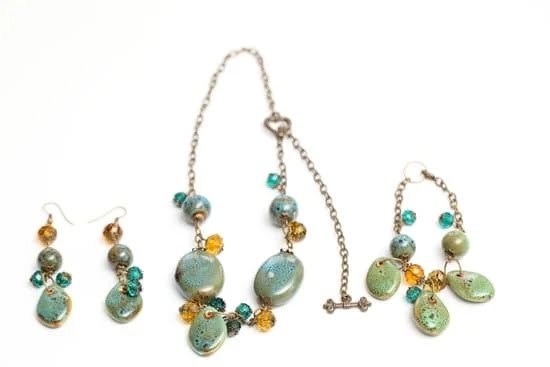Are you wondering how to sell fine jewelry consignment and maximize your profits? Selling fine jewelry on consignment can be a great way to turn your valuable pieces into cash, while also ensuring that they are showcased in a professional setting.
In this article, we will explore the various steps involved in selling fine jewelry on consignment, including understanding the benefits, choosing the right consignment store or platform, assessing and preparing your jewelry, setting a fair price, marketing, negotiating terms, and maximizing your profits.
Selling fine jewelry on consignment offers numerous benefits for sellers. It allows you to reach a wider audience of potential buyers, as consignment stores or platforms often have established customer bases. Additionally, it provides a secure and professional environment for showcasing your jewelry, which can increase its perceived value and attractiveness to buyers. Furthermore, consignment sales can result in higher prices for your fine jewelry compared to selling them outright.
To successfully navigate the process of selling fine jewelry on consignment, it is essential to research and choose the right consignment store or platform. This involves evaluating their reputation, customer base, commission rates, and overall fit with your specific type of fine jewelry.
Additionally, properly assessing the value of your fine jewelry and preparing it for consignment are crucial steps in maximizing your chances of making successful sales. Stay tuned as we delve into each step in detail throughout this article.
Researching and Choosing the Right Consignment Store or Platform
When it comes to selling fine jewelry on consignment, choosing the right store or platform is crucial for ensuring a successful sale. The first step in this process is to thoroughly research potential consignment options. This can include visiting local consignment stores, exploring online platforms, and asking for recommendations from friends or family who have experience with selling jewelry on consignment. Additionally, reading reviews and testimonials can provide valuable insight into the reputation and reliability of different consignment options.
Once you have compiled a list of potential consignment stores or platforms, it’s important to carefully consider their specific criteria and terms for accepting fine jewelry. Some stores may specialize in certain types of jewelry or have restrictions on the brands they accept, so ensure that your pieces align with their requirements.
It’s also essential to review the commission rates and any additional fees associated with each potential option to make an informed decision about which will offer the best return on your investment.
After evaluating all available options, it’s time to reach out to each potential consignment store or platform to inquire about their specific processes and requirements for accepting fine jewelry. This may involve scheduling appointments to meet with store owners or managers, submitting detailed information and photographs of your jewelry, or discussing their policies over the phone. By communicating directly with these outlets, you can gain a better understanding of what they offer and how they will represent your jewelry.
| Choosing Consignment Store/Platform | Key Considerations |
|---|---|
| Research Potential Options | Visit local stores, explore online platforms, read reviews |
| Consider Criteria & Terms | Ensure pieces align with requirements; review commission rates & fees |
| Reach Out & Inquire | Schedule appointments; submit information & photos; discuss policies directly |
Assessing the Value of Your Fine Jewelry
Seek Professional Appraisal
Before selling your fine jewelry on consignment, it’s essential to have a clear understanding of its value. One way to do this is by seeking a professional appraisal. A certified gemologist or appraiser can provide you with an accurate evaluation of your jewelry’s worth based on factors such as the quality of the materials, craftsmanship, and market demand.
Evaluate Market Trends
In addition to getting a professional appraisal, it’s important to stay informed about current market trends. The value of fine jewelry can fluctuate based on factors such as changes in consumer preferences, fashion trends, and economic conditions. Researching recent sales of similar pieces can give you an idea of what buyers are willing to pay for items like yours.
Consider Sentimental Value
While assessing the monetary value of your fine jewelry is crucial when selling on consignment, it’s also important to consider any sentimental value attached to the piece. Whether it’s a family heirloom or a piece with personal significance, sentimental value can impact your decision-making process when setting a price for consignment.
By carefully evaluating the value of your fine jewelry through professional appraisal, market research, and consideration of sentimental value, you can make informed decisions when entering into consignment agreements and maximize your profits from the sale.
Preparing Your Fine Jewelry for Consignment
When preparing your fine jewelry for consignment, there are several important steps to take to ensure that your pieces have the best chance of selling and fetching a fair price. The first step is to thoroughly clean and polish your jewelry to make sure it looks its best. This may involve taking your pieces to a professional jeweler for cleaning, especially if they have not been worn or cleaned in some time.
Additionally, it’s important to gather any relevant documentation for your fine jewelry, such as certificates of authenticity, appraisals, or receipts. This paperwork can help verify the quality and value of your pieces, which can be appealing to potential buyers shopping on consignment platforms or in stores.
Another crucial part of preparing your fine jewelry for consignment is taking high-quality photos of each piece. Good lighting and clear, detailed shots from multiple angles can make a big difference in how your jewelry is perceived by potential buyers. If you’re not confident in your own photography skills, consider hiring a professional photographer to capture the beauty of your jewelry.
Finally, consider packaging and presenting your fine jewelry in an attractive and secure way. This means using appropriate storage containers or boxes that will protect the pieces during handling and transport. An elegant display can make a big impression on both consignment store owners and potential buyers.
| Preparing Your Fine Jewelry | Data |
|---|---|
| Clean and Polish | Take jewelry to a professional if necessary |
| Gather Documentation | Certificates of authenticity, appraisals, receipts |
| High-Quality Photos | Clear, detailed shots from multiple angles |
| Packaging and Presentation | Use attractive and secure storage containers or boxes |
Setting a Fair Price for Your Fine Jewelry
Understand the Market Value
Before setting a price for your fine jewelry, it’s essential to understand its market value. Researching similar pieces of jewelry can give you an idea of what the market is willing to pay. Look for comparable items in terms of metal purity, gemstone quality, and overall design. This will help you determine a fair starting price for your jewelry.
Consider All Factors
When setting a price for your fine jewelry, it’s crucial to consider all factors that contribute to its value. This includes the cost of materials, craftsmanship, brand reputation (if applicable), and any additional features such as unique designs or historical significance. Take into account the condition of the jewelry as well, as this can impact its selling price.
Consult With Experts
If you’re unsure about pricing your fine jewelry for consignment, consider consulting with appraisers or experts in the field. Their expertise can provide valuable insights into the current market trends and pricing strategies. Professional advice can help you avoid overpricing or underpricing your jewelry, ultimately maximizing your chances of a successful consignment sale.
By understanding the market value, considering all factors that contribute to its worth, and seeking expert advice if necessary, you can set a fair price for your fine jewelry when selling on consignment. This approach will not only attract potential buyers but also ensure that you receive a reasonable return on your investment.
Marketing Your Fine Jewelry for Consignment
When it comes to selling your fine jewelry on consignment, marketing plays a crucial role in ensuring that your pieces get the attention they deserve. By effectively marketing your fine jewelry, you can attract potential buyers and increase the chances of making a sale. Here are some key strategies for successfully marketing your fine jewelry for consignment:
- Professional Photography: Invest in high-quality photographs of your fine jewelry to showcase its beauty and craftsmanship. Clear, detailed images can capture the attention of potential buyers and highlight the unique features of each piece.
- Social Media Promotion: Utilize social media platforms to promote your consigned fine jewelry. Share visually appealing images of your pieces along with engaging captions that provide information about the materials used, design inspiration, and any special details that make each piece unique.
- Networking with Local Jewelry Enthusiasts: Reach out to local jewelry enthusiasts, collectors, and industry contacts to spread the word about your consigned fine jewelry. Attend industry events, join networking groups, and engage with potential buyers who appreciate the value of high-quality pieces.
Marketing Your Fine Jewelry for Consignment involves strategic planning and creative execution to attract interested buyers. By utilizing professional photography, social media promotion, and networking with local jewelry enthusiasts, you can effectively market your consigned fine jewelry and increase the likelihood of making successful sales.
These strategies will help you create a buzz around your fine jewelry pieces and generate interest from potential buyers How to Sell Fine Jewelry Consignment. By taking a proactive approach to marketing, you can maximize the visibility of your consigned items and optimize the chances of achieving profitable sales.
Negotiating Terms With the Consignment Store or Platform
When it comes to selling your fine jewelry on consignment, negotiating terms with the consignment store or platform is a crucial step in the process. Before entering into any agreement, it’s important to understand the terms and conditions set forth by the store or platform. This includes determining the commission rate, payment schedule, insurance coverage, and any additional fees that may apply. Negotiating these terms can ultimately impact your overall profit from the sale of your fine jewelry.
First and foremost, it’s essential to research and compare different consignment options to find the best fit for your fine jewelry. Some consignment stores may have a higher commission rate but offer a more prominent location with increased foot traffic, while online platforms may have lower overhead costs but reach a broader audience. Understanding these differences will allow you to negotiate terms that align with your goals for selling your fine jewelry on consignment.
Additionally, don’t hesitate to negotiate the commission rate with the consignment store or platform. While many stores have a standard commission rate, there may be room for negotiation based on the value and desirability of your fine jewelry pieces. By effectively negotiating these terms, you can ensure that you are maximizing your profits from the sale of your fine jewelry while still providing an attractive opportunity for the consignment store or platform.
Maximizing Your Profits From Fine Jewelry Consignment Sales
So, you’ve decided to sell your fine jewelry on consignment. Congratulations. This can be a lucrative way to make some extra cash and clear out items that you no longer wear. But how do you maximize your profits from this process? Here are some tips to help you get the most out of your fine jewelry consignment sales:
- Choose the right consignment store or platform: Research and compare different options to find the best fit for your jewelry.
- Assess the value of your fine jewelry: Get an appraisal from a professional to determine the true value of your pieces.
- Prepare your fine jewelry for consignment: Clean and polish your items so they look their best when on display.
Once you have found the right outlet for selling your fine jewelry on consignment, it’s important to focus on maximizing your profits. One way to do this is by setting a fair price for your items. Consider factors such as brand, materials, and current market trends when determining an appropriate price. You want to set a price that is attractive to buyers while also ensuring that you get a fair return on your investment.
Marketing is another key aspect of maximizing profits from fine jewelry consignment sales. Work with the consignment store or platform to promote your items through social media, email marketing, or even in-store events. The more exposure your jewelry gets, the better chance it has of being sold at a higher price.
Lastly, don’t forget about negotiating terms with the consignment store or platform. Be open to discussing details such as commission rates, length of time items will be listed, and any additional fees that may impact your overall profits. By being proactive in these discussions, you can ensure that both parties are satisfied with the arrangements and set yourself up for success in selling your fine jewelry on consignment.
Managing the Consignment Process and Ensuring Security of Your Fine Jewelry
In conclusion, selling fine jewelry on consignment can be a lucrative and convenient way to earn money from your valuable pieces. By understanding the benefits of consignment, researching and choosing the right store or platform, assessing the value of your jewelry, and preparing it for consignment, you can set yourself up for success.
It’s important to set a fair price for your jewelry, market it effectively, negotiate terms with the consignment store or platform, and take steps to maximize your profits.
Once you have entered into a consignment agreement, it is crucial to manage the process effectively and ensure the security of your fine jewelry. This involves keeping detailed records of your inventory, staying in regular communication with the consignment store or platform, and verifying that proper security measures are in place. Additionally, maintaining insurance on your jewelry can provide added peace of mind during the consignment process.
Ultimately, successfully selling fine jewelry on consignment requires attention to detail and proactive management. By following these steps and taking precautions to safeguard your valuable pieces, you can optimize your chances of earning a fair price for your jewelry while benefiting from the convenience of consignment sales.
Frequently Asked Questions
How Do I Get the Most Money to Sell My Jewelry?
To get the most money for selling your jewelry, it’s important to have your pieces appraised by a qualified and reputable appraiser. This will give you a fair idea of its value and what you can expect to sell it for. You can also consider selling your jewelry through reputable online platforms or through consignment with a trustworthy jeweler.
Is Selling Fine Jewelry Profitable?
Selling fine jewelry can indeed be profitable, especially if the pieces are high quality, in-demand brands, or rare and unique. However, it’s important to factor in any potential costs such as appraisal fees, commission from sales through third parties, or marketing expenses in order to ensure that the overall profitability of selling fine jewelry is maximized.
How Can I Sell My Jewelry Without Getting Ripped Off?
When selling your jewelry, it’s crucial to do thorough research on potential buyers or platforms. Look for reviews and feedback from other sellers and ensure that they have a good reputation for fair pricing and honest dealings.
Get multiple appraisals for your pieces and compare offers before making a decision. Additionally, consider getting everything in writing before finalizing any sale to protect yourself from potential scams or dishonest transactions.

Welcome to my jewelry blog! My name is Sarah and I am the owner of this blog.
I love making jewelry and sharing my creations with others.
So whether you’re someone who loves wearing jewelry yourself or simply enjoys learning about it, be sure to check out my blog for insightful posts on everything related to this exciting topic!





